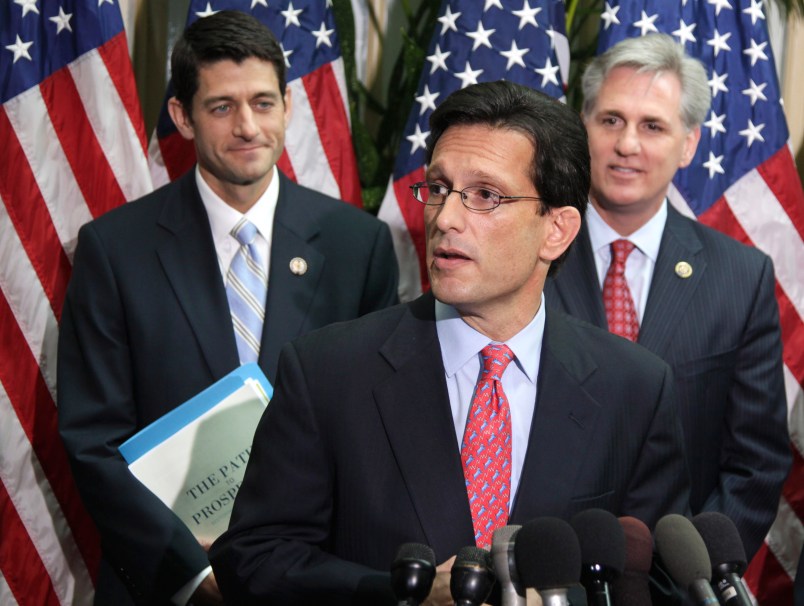Republicans want something in return for acting to avert a self-inflicted default on the country’s debt, but they can’t figure out what.
House Republicans discussed the issue last Friday at their annual all-member retreat in Maryland. As of Monday afternoon, they still hadn’t come up with a ransom demand in order to free the proverbial hostage ahead of a late February deadline.
“We had a good discussion at the retreat, and there was general agreement that a ‘clean’ increase is not a good option – but no consensus yet other than than,” a House GOP leadership aide said on Monday.
The problem is that Republicans don’t want to raise the borrowing limit without extracting concessions from the White House, but are struggling to devise a proposal that can achieve 217 votes to pass out of the House and thereby force a hostage standoff. They have 232 members, and a number of staunch conservatives don’t want to vote for any debt limit hike.
Meanwhile, Democrats are refusing to submit to any demands merely to avert default, and the White House vows that raising the debt limit “cleanly,” without policy add-ons, is non-negotiable, as Congress did twice last year.
One idea under serious discussion during the retreat, according to GOP leadership aides, was to tie a one-year increase in the debt limit to legislation that eliminates a mundane stability mechanism in Obamacare that Republicans deride as a “bailout” for insurance companies. The provision, called risk corridors, creates a pot of money through 2016 that is funded by insurers with low-risk customers and pays insurers with high-risk customers.
Another idea floated by some conservatives was to force President Barack
Obama to approve the Keystone XL pipeline, which the State Department
announced last Friday wouldn’t have significant environmental impacts.
But a significant number of conservatives are wary, viewing these as shiny objects for politicking which won’t force major reforms or make it worth their while to cast a vote that has become toxic in right-wing circles.
And so top Republicans were left without a plan and reduced to reciting old talking points on the Sunday talk shows.
“Well, we have had policies attached to the debt limit before,” House Budget Chair Paul Ryan (R-WI) said on ABC’s “This Week.” “What we don’t like is this idea of continually rubber-stamping debt limit increases without acknowledging the problem that got us into debt in the first place.”
“I’m hopeful that the president and the Senate will work with us in the House to [make] some progress towards addressing the spending problem in Washington,” House Majority Leader Eric Cantor (R-VA) said on CBS’ “Face The Nation.” “This President has just consistently said he doesn’t want to even engage, and is, like, ignoring the problem.”
The GOP’s demonstrated unwillingness to shoot the proverbial hostage and risk default — even if it means raising the debt limit without any policy concessions — is why Democrats aren’t taking their threats seriously.
“I’m confident there will be no default,” Cantor said.
Treasury Secretary Jack Lew reiterated on Monday that the U.S. will exhaust all measures to borrow by late February and urged Congress to “move right away” to lift the borrowing limit.
“We now forecast that we are likely to exhaust these measures by the end of this month,” he said at the Bipartisan Policy Center, pointing out tax refunds during filing season “deplete borrowing capacity very quickly.”






